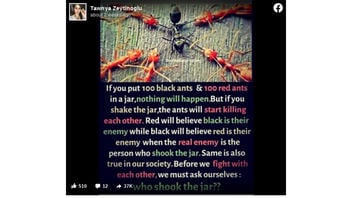STORY UPDATED: check for updates below.

Are red ants and black ants peaceful if placed in the same enclosure, but start fighting when an outside force shakes them? No, that's not true: There are thousands of species of red ants and black ants, not just one per color. There is no set rule as to when ants will fight versus not fight. Two professors knowledgeable about ants told us that no shaking is necessary to start a fight between two different species of ants.
The claim appeared in a Facebook post (archived here) where it was published on September 24, 2021. The post read:
If you put 100 black ants & 100 red ants in a jar, nothing will happen.But if you shake the jar,the ants will start killing each other. Red will believe black is their enemy while black will believe red is their enemy when the real enemy is the person who shook the jar. Same is also true in our society. Before we fight with each other, we must ask ourselves: who shook the jar??
This is what the post looked like on Facebook at the time of writing:
(Source: Facebook screenshot taken on Thu Oct 7 14:36:41 2021 UTC)
If the author of the post was trying to make a metaphorical statement about human behavior by relating it to that of ants, they might have been better to choose a different animal for the illustration.
Walter Tschinkel, an ecology and evolution professor at Florida State University, told Lead Stories that ants don't necessarily need an outside force like a shaking to go at each other.
Whoever posted this knows absolutely nothing about ants. "Red ants" and "black ants?" Really? There are 14,000 species of ants in the world, not just red and black. The ants depicted here are two different species of Camponotus or similar. Attack across species lines is common among ants. No shaking is necessary. Weaver ants are found in s.e. Asia, Africa and Australia. They make nests in trees and are very aggressive to a range of interlopers, including other ants, as well as weaver ants from other colonies.
John Longino, a myrmecologist from the University of Utah, told us:
The picture shows Oecophylla, a notorious territorial ant in Africa and Asia, attacking some other ant. They'll attack anything. There are thousands of species of "red" ants and thousands of species of "black" ants. Some ants dont fight no matter what. Some ants will hang out in a jar for a while, but if you shake them they release formic acid, which makes them all go crazy, attacking anything, including nest mates. Because it is a general alarm signal.
Updates:
-
2021-10-07T23:20:00Z 2021-10-07T23:20:00Z Updated to correct a typo in "formic acid"


















